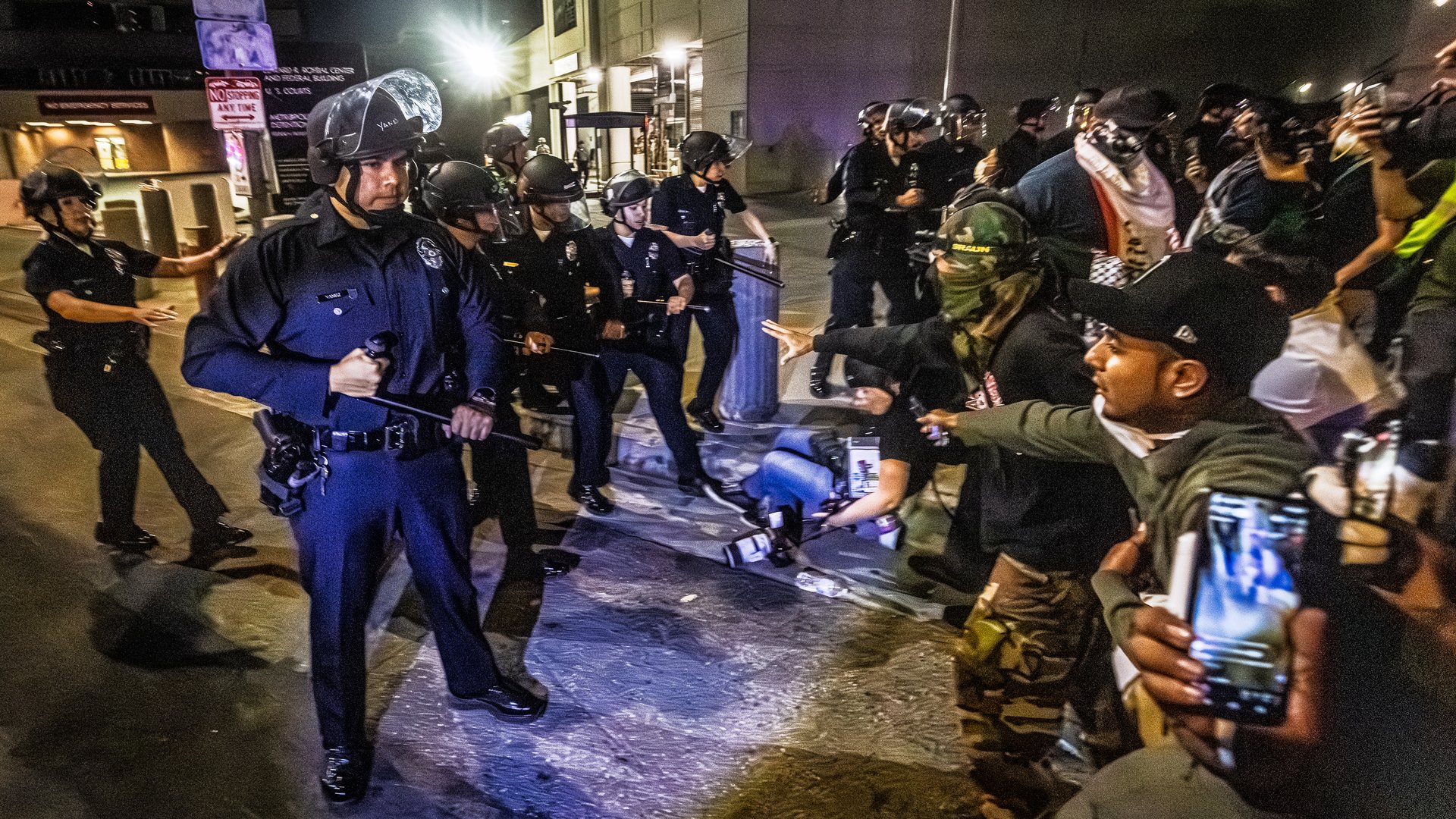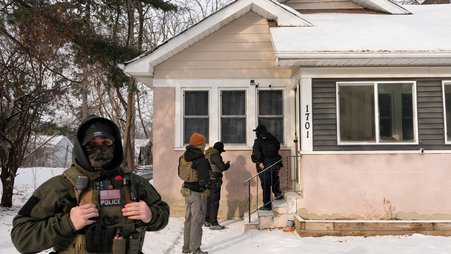It was bad enough when government officials claimed that journalists incite violence by reporting. But now, they’re accusing reporters of actually committing violence.
The supposed violence by reporters? Recording videos. At least three times recently, a government official or lawyer has argued that simply recording law enforcement or Immigration and Customs Enforcement officers is a form of violence.
In July, Department of Homeland Security Secretary Kristi Noem proclaimed during a news conference following ICE raids on California farms that videotaping ICE agents performing operations is “violence.” Noem lumped video recordings in with other forms of actual violence, like throwing rocks or Molotov cocktails at agents.
Then, in August, Justice Department lawyer Sean Skedzielewski argued, during a court hearing over the Los Angeles Police Department’s mistreatment of journalists covering protests, that videotaping law enforcement officers “can be used for violence.” He claimed recording is violent because it can reveal officers’ identities, leading to harassment, and can encourage more protesters to join the fray.
Also in August, the government applied similar logic as it fought against the release of Mario Guevara, the only journalist in U.S. custody after being arrested for newsgathering. Guevara, who is originally from El Salvador, was detained while covering a protest in Georgia and turned over to ICE for deportation. In a bond hearing before an immigration court in July, according to the Committee to Protect Journalists, the government argued that Guevara’s recording and livestreaming of law enforcement “presents a safety threat.”
At the risk of stating the obvious, videotaping someone is not the equivalent of throwing a firebomb at them. Actually, recordings of law enforcement officers made by journalists and members of the public allow the public to see what the police are up to and hold officers accountable for abusing their authority or breaking the law.
That includes holding officers who are violating the First Amendment accountable in court. Adam Rose, chair of the press rights committee for the LA Press Club, said that Skedzielewski also denied in court that DHS officers had pointed weapons at journalists, despite video evidence submitted to the court of them doing exactly that.
Skedzielewski “wound up making our case for us,” Rose told us. “His own argument showed how the government can try to lie in court, and why filming in public is critical to ensure the truth comes out.”
Video recording police in public is also protected by the First Amendment, as both Rose and Mickey Osterreicher, the general counsel for the National Press Photographers Association, point out. “The claim that journalists and others video recording police are engaged in ‘acts of violence’ is not only absurd on its face but flies in the face of the law and common sense,” said Osterreicher.
That constitutional right applies even if officers would prefer not to be identified. The government often claims that officers must not be identified because they’re at risk of (real) violence or harassment. But the correct response to those threats is to prosecute and punish those who actually break the law by harassing or physically attacking police, not make up crimes to go after those who exercise their First Amendment right to record them.
The government claims at other times that officers should not be recorded because they’re undercover. The government has been known to abuse this argument, including by making bizarre claims that any officer who may, at some point, go undercover should be treated as undercover at all times. Plus, journalists have no way of knowing whether a particular agent participating in an immigration raid or officer policing a protest is undercover at the moment they’re recording. The responsibility of preserving officers’ cover is on the officer and the government, not journalists and the public who can observe them working in plain view.
These justifications, however, are mere pretext for the government’s true purpose. Officials want courts and the public to believe that recording agents and officers is a violent act because it justifies officers’ own violent response to the press.
In LA, government attorney Skedzielewski didn’t just argue that video recording is violent. He said that meant that justified officers in using force against people videotaping them. This claim—made in a court that’s already restrained police from attacking journalists after they were documented violently assaulting and detaining reporters repeatedly —should seriously alarm journalists and anyone who wants to record police.
“For an officer of the court to conflate the use of recordings to reveal police officers’ identities with the actual making of those recordings, in order to justify the use of excessive force against those doing the recording, shows complete ignorance of the law, disregard for the Constitution, a blatant attempt to demonize those who would dare risk their health and safety to provide visual proof of police behavior, or all three,” said Osterreicher.
That demonization is working, unfortunately, especially when it comes to ICE officers’ beliefs about how they can respond to being recorded. In recent months, ICE officers have knocked phones out of the hands of those recording them, pulled weapons on people photographing or videotaping them, and even arrested U.S. citizens for filming them.
The escalating attacks on journalists and citizens who are recording police show the danger of the government’s rhetoric. All who care about press freedom and transparency must push back on claims equating filming to violence.
When officials say at news conferences that video recording is violent, journalists should challenge that assertion and cite the law.
When attorneys argue that recording police justifies violence or arrest, they should have their arguments confronted by opposing counsel and the judge, who has the power to sanction lawyers who ignore First Amendment jurisprudence to make frivolous arguments on behalf of the government.
And when ICE officers harass or detain someone for videotaping them, everyone else should take out their phones and hit the record button.
Recording the police isn’t violence. Don’t let officials get away with loud, incorrect claims to the contrary to diminish our First Amendment rights.





